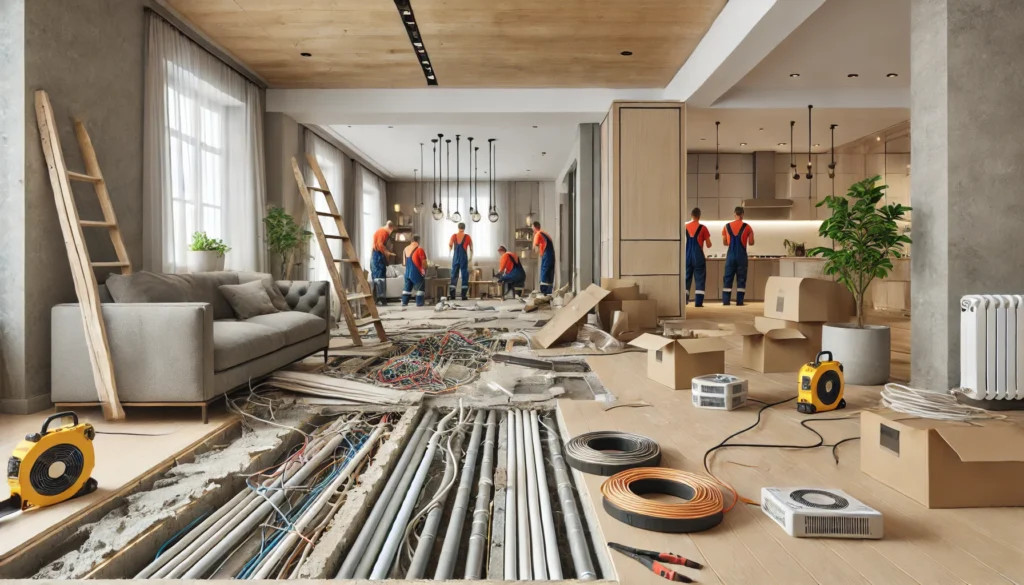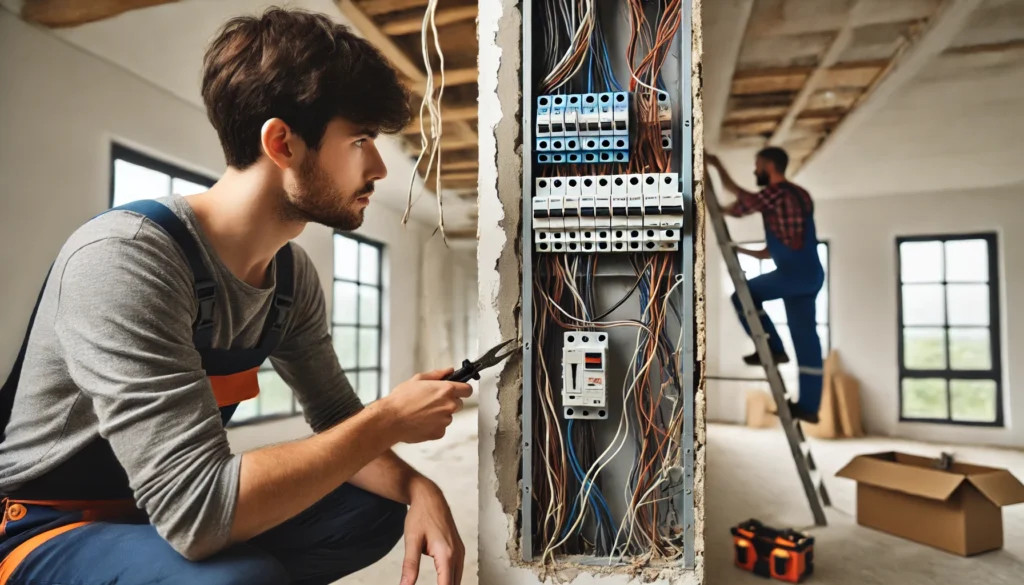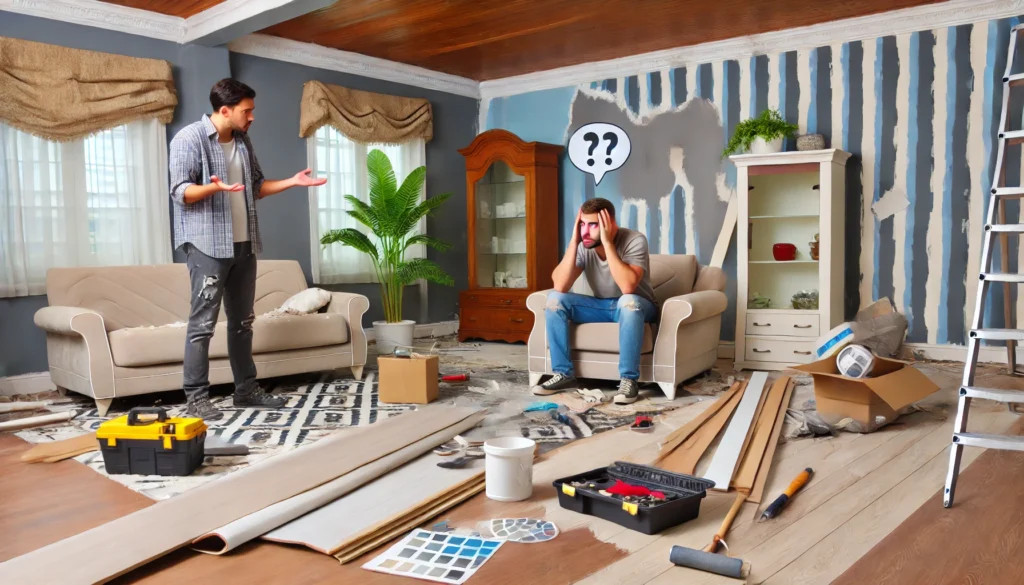HGTV’s “No Demo Reno,” hosted by Jennifer Todryk, has become a popular show, celebrated for its innovative approach to home transformations without extensive demolition. It offers a vision of beautiful home renovations, seemingly achieved without the typical disruptions and mess. However, recent events have cast a shadow over this image. A significant lawsuit, somewhat ironically unrelated to typical concerns like asbestos exposure that might necessitate a mesothelioma lawyer, but very much related to home safety and legal recourse, has emerged, bringing serious questions about the quality and safety of renovations featured on the show into sharp focus. While the show itself is not about asbestos or diseases like mesothelioma, understanding legal disputes around home renovations, perhaps even finding relevant videos on platforms like Vimeo, becomes crucial for homeowners considering similar projects.
This article delves into the details of the lawsuit against “No Demo Reno,” exploring the homeowners’ allegations, HGTV’s response, and the wider implications for viewers and anyone contemplating home renovations. While you might search Vimeo for insights from a Reno mesothelioma lawyer on various legal topics, here we focus on a different kind of legal issue – construction disputes and homeowner rights.
Background of the “No Demo Reno” Lawsuit
In 2022, Joe and Mandy Smith, homeowners from Texas, initiated legal action against HGTV’s “No Demo Reno.” Their lawsuit centers on claims that the renovation of their home, showcased on the program, was fundamentally flawed and plagued by numerous defects. The Smiths contend that the renovation resulted in a multitude of unsafe and substandard conditions, going beyond mere aesthetic disappointments to pose genuine dangers. They claim to have identified over 90 distinct problems with the completed work, encompassing critical electrical and gas safety violations. Consequently, the Smiths are seeking damages amounting to approximately $1.477 million to address the extensive repairs required and the financial losses incurred due to the deficient renovation work.
 A modern home under renovation showcasing visible construction issues, including uneven flooring and exposed wiring.
A modern home under renovation showcasing visible construction issues, including uneven flooring and exposed wiring.
Major Allegations Detailed in the Lawsuit
The Smiths’ legal complaint outlines a series of serious accusations concerning the quality and safety standards of the renovation work performed on their property. These allegations extend beyond superficial cosmetic issues, raising significant concerns about potential risks to the homeowners’ safety and overall well-being.
Unsafe Electrical and Gas Practices Alleged
A primary concern highlighted in the Smiths’ lawsuit is the allegedly hazardous electrical work conducted during the renovation. They assert that electrical installations were carried out without securing the necessary permits, a lapse that could lead to increased risks of fire hazards and other dangerous electrical incidents. Adding to the safety concerns, the Smiths further claim that the gas lines within their home were improperly installed. Incorrect gas line installations are critically dangerous, as they can lead to gas leaks, posing severe risks of explosions and carbon monoxide poisoning. These are the kinds of hidden dangers that are the opposite of what homeowners expect from a televised renovation project.
Faulty Installations and Substandard Workmanship
Beyond the critical safety issues, the Smiths also reported widespread problems with the general quality of the renovation. They detailed numerous instances of faulty installations and poor workmanship throughout their home, including:
- Damaged and improperly laid floorboards
- Uncovered holes left in walls
- Use of inferior, low-grade materials across various aspects of the renovation
- Significant issues with the dishwasher installation, notably the absence of an essential air gap, which can lead to water contamination and health hazards.
These issues collectively suggest a pattern of rushed or inadequately supervised work, resulting in a final outcome that fell significantly short of the homeowners’ reasonable expectations and industry standards.
 A close-up of a faulty electrical panel highlighting safety risks during renovations.
A close-up of a faulty electrical panel highlighting safety risks during renovations.
Claims of Financial Mismanagement
A key component of the lawsuit involves allegations of financial mismanagement. The Smiths contend that the funds they allocated for the renovation were not applied responsibly or effectively. They claim that a significant portion of their investment was misdirected, with only a fraction actually being used for the intended renovation work. This alleged financial impropriety has intensified the homeowners’ dissatisfaction, as they feel they were not only provided with substandard work but also financially exploited in the process.
More Read
 72 SOLD Lawsuit
72 SOLD Lawsuit
72 SOLD Lawsuit: What Homeowners and Real Estate Agents Need to Know About the Legal Dispute
Hermes Birkin Class Action Lawsuit: Could This Be the Beginning of More Lawsuits Against Luxury Brands?
 Paul Mackoul Lawsuit
Paul Mackoul Lawsuit
Paul MacKoul Lawsuit: How Legal Cases Against Doctors Affect the Healthcare Industry
Allegations of Scripted Reality in TV Show
Adding another layer to the dispute, the Smiths have suggested that the reality depicted on “No Demo Reno” might have been manipulated. They claim that participants, including themselves, were instructed on how to act and what to say, raising questions about the authenticity of the entire premise. While the show is presented as a genuine account of home renovations, the Smiths believe their experiences were significantly orchestrated for entertainment purposes, potentially misleading viewers about the true nature of such projects. This raises broader questions about the reality in reality television, and the expectations viewers should have.
HGTV’s Official Response to the Lawsuit
In response to the lawsuit, HGTV has clarified its position, stating that homeowners who participate in “No Demo Reno,” like the Smiths, enter into direct contractual agreements with the independent contractors responsible for carrying out the renovation work. The network emphasizes that while “No Demo Reno” provides a platform to facilitate these renovations, the ultimate accountability for ensuring proper and safe completion of the work rests with the homeowners and the contractors they directly engage.
Furthermore, HGTV has indicated that standard agreements signed by homeowners typically include clauses that prevent them from publicly disclosing any disputes or problems arising from the renovation process. This suggests that HGTV maintained a degree of separation from the actual execution of the renovations and did not assume direct responsibility for resolving subsequent issues. Despite this contractual distance, HGTV has publicly encouraged both the homeowners and the contractors involved to collaborate and find amicable resolutions to any unresolved issues, advocating for a cooperative approach to problem-solving.
Legal Proceedings and Current Case Status
As of January 2025, the lawsuit initiated in 2022 remains in progress. There have been no significant public updates regarding the case’s progression, and it is currently uncertain whether the dispute will proceed to a full trial or if the involved parties will reach a settlement agreement outside of court. Legal experts have speculated that a settlement might be a more probable outcome, as both HGTV and the homeowners may prefer to avoid the protracted and costly nature of extended litigation. However, neither the Smiths nor HGTV have issued any official statements confirming ongoing negotiations or anticipated next steps in the legal proceedings. The situation remains fluid, and the resolution is still pending.
Public Reaction and Wider Implications
The “No Demo Reno” lawsuit has resonated widely, prompting significant discussions not only about the integrity of home renovations depicted on reality TV but also about the production practices of such shows. Dedicated viewers of “No Demo Reno” are now re-evaluating their perceptions of the renovations presented, questioning whether the transformations are genuinely as seamless and problem-free as portrayed. Many viewers may have previously assumed that a program backed by a reputable network like HGTV would inherently guarantee high-quality workmanship and strict adherence to safety regulations. However, this lawsuit serves as a stark reminder that even widely-viewed television programs can have underlying issues and potential shortcomings.
The lawsuit has also ignited conversations about the potential vulnerabilities of homeowners who decide to participate in home renovation shows. Many participants may not fully grasp the potential risks involved or might feel pressured to compromise on quality to align with the show’s production schedule and narrative demands. This case underscores the critical importance of homeowners conducting thorough due diligence, securing robust contracts, and maintaining vigilant oversight throughout any home renovation project, whether televised or not.
 A partially renovated living room featuring mismatched paint and crooked flooring illustrates renovation challenges.
A partially renovated living room featuring mismatched paint and crooked flooring illustrates renovation challenges.
Key Lessons for Homeowners Undertaking Renovations
The “No Demo Reno” lawsuit provides crucial learning points for homeowners, especially those considering any type of renovation, regardless of whether it’s for a TV show or a personal project. These key lessons can help mitigate risks and ensure a smoother, more successful renovation experience.
Conduct Comprehensive Research and Due Diligence
Prior to embarking on any renovation endeavor, homeowners must invest time in thoroughly researching and vetting potential contractors. It is essential to confirm that contractors are properly licensed, adequately insured, and possess a verifiable track record of successful projects. Checking references from previous clients and carefully reviewing portfolios of past work can provide valuable insights into a contractor’s reliability and capability to deliver high-quality results. Just as one might research a Reno mesothelioma lawyer on Vimeo before choosing legal counsel, thorough research is paramount when selecting a contractor.
Ensure Contracts Are Explicit, Clear, and Detailed
A well-drafted, comprehensive contract is indispensable for any renovation project. Homeowners should meticulously review and ensure that all facets of the project are clearly and unambiguously defined in the contract. This includes a precise scope of work, a realistic project timeline, specifications for materials to be used, and a complete breakdown of the total project cost. Crucially, the contract should also incorporate clauses that explicitly outline the procedures and remedies in the event of disputes, unforeseen issues, or if the quality of work falls below acceptable standards.
Maintain Active Involvement and Diligently Monitor Progress
Homeowners should adopt a proactive approach by staying actively engaged throughout the entire renovation process. Regularly checking in on the progress of the work and consistently verifying that it aligns with the agreed-upon specifications and quality benchmarks is essential. Such ongoing oversight can help identify potential problems early on, preventing minor issues from escalating into major complications. If any concerns or discrepancies arise, it is vital to address them promptly and directly with the contractor, rather than allowing them to remain unaddressed and potentially worsen over time.
Conclusion
The No Demo Reno Lawsuit has brought critical attention to significant issues within the realm of reality TV home renovations. While the show aimed to be an entertaining and inspirational resource for homeowners, it has inadvertently highlighted the inherent risks and potential pitfalls associated with home renovation projects, especially those conducted under the auspices of television production. Regardless of whether the lawsuit concludes through a settlement or proceeds through the judicial system, it serves as a potent reminder to homeowners of the necessity for vigilance, informed decision-making, and proactive management throughout their renovation endeavors.
By taking heed of the lessons learned from the Smiths’ experience, homeowners can proactively minimize the risks commonly encountered during home renovations. This informed approach can significantly increase the likelihood of projects being completed safely, within budget, on schedule, and to a consistently high standard of quality. Reality TV shows like “No Demo Reno” may offer aspirational content and entertainment, but it is paramount for homeowners to approach renovations with realistic expectations, comprehensive preparation, and a commitment to diligent oversight.
FAQs
What is the primary basis for the lawsuit against “No Demo Reno”?
The lawsuit primarily alleges substandard workmanship, unsafe renovation practices, and financial mismanagement stemming from the home renovation featured on the show.
What amount in damages are the homeowners seeking?
Joe and Mandy Smith are seeking approximately $1.477 million in damages to cover the extensive costs of repairing the defects and the related financial losses they have incurred.
Did HGTV assume direct management of the renovation work?
No, HGTV has stated that homeowners directly contracted with independent contractors for the renovation work, with HGTV’s role being limited to providing a platform for the show.
What specific safety hazards are cited in the lawsuit?
The lawsuit details unsafe electrical work and improperly installed gas lines as the primary safety hazards resulting from the renovation.
Is the lawsuit currently resolved?
As of January 2025, the lawsuit is still ongoing, and there have been no publicly reported updates indicating a resolution or settlement.
Article Recommendations
Wingate Wilderness Lawsuit: Legal, Social, and Ecological Dimensions Explored
Wordscapes Lawsuit: Lessons for Developers on Copyright Compliance and Licensing
Kerrigan Somerville Lawyer Yoga: Practical Strategies for Integrating Wellness Into a Legal Career
Streamate Lawsuit: Unpacking the Performers’ Grievances and Their Impact on the Digital Entertainment Industry
Chula Vista Mesothelioma Lawyer Vimeo: Discover Your Legal Options Through Online Resources
